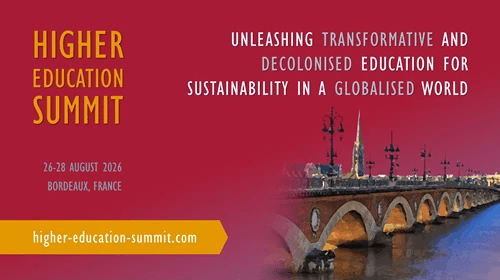
RESEARCH LABS
Research labs are interactive sessions of 60 minutes. Facilitators will share their innovative didactic approaches and might reveal the tricks how they made it happen. They tell their stories, welcome feedback and seek interaction with the crowd.
DAY 1

I-week on sustainability: from course to international conference for Bachelor students
Luc Van Liedekerke, Sara Weyns
Topic: Rethinking the (economics) curriculum
Time: Day 1 (6 September), 14.35-15.35 CET
Room: FR-0.01
In this session, we will share the story of our course I-week on Sustainability and how we transformed it into an international hybrid conference with students and speakers from 5 different continents. We will go into the goals we try to achieve with the course; to teach about sustainability, to develop our students intercultural skills and to also trigger personal development around sustainability. In the second part of the session we will go into the challenges we face, ask for feedback and suggestions on our setup, look for dimensions that are missing, and discuss possible extension of this course with additional partners.

Knowledge is not something that you have: decolonizing images of knowledge in the higher education curriculum
Maristela do Nascimento Rocha, Ivã Gurgel, Katrien Struyven
Topic: Rethinking the (economics) curriculum
Time: Day 1 (6 September), 14.35-15.35 CET
Room: FR-0.06
In this research lab we are going to explore a possible way of decolonizing the curriculum by studying the history of disciplines and comparing them to the knowledge as it is presented in textbooks inside higher education courses. The idea is to try to see that the formal knowledge from today is a selection of meanings that were before connected to actual practices and subjectivities, and in this way, to search for the world-pictures sustaining the language that created this knowledge. The current selection of knowledge favours the values and interests of powerful groups and in order to escape this, we argue that there should be a focus on the teaching of world-pictures instead of knowledge. This would allow for the insertion of the student’s subjectivity – as for creativity and critical thinking, in the Wittgensteinian sense. We defend our argument through an analysis of the Newtonian mechanics as understood by Isaac Newton and what we call “marginal scientists”: Julio Garavito Armero (Colombian, 1865-1920), André Koch Torres Assis (Brazilian, 1962- ), and Ernst Mach (Austrian, 1838-1916). We will invite the public to explore and problematize the presented ideas by trying to apply them to sustainability- or other types of knowledge.

Circular mindset and capabilities for circular design solutions
Eglė Staniškienė, Lina Dagilienė, Rūta Valušytė
Topic: Co-creative, transformative learning environments
Time: Day 1 (6 September), 14.35-15.35 CET
Room: FR-0.09
Our study is related to the ongoing project „Circular Design TOOLS for product integrity“ (ŽIEDIS). Most companies are currently profoundly rooted in a linear approach to growth - make, use, dispose, researchers and entrepreneurs, individual innovators – the generators of new knowledge and innovative product ideas, lack the design and circular capabilities. As a result, they meet serious challenges while developing them into products in line with circular economy principles. The project proposes to empower the CE supportive environment by developing CIRCULAR DESIGN TOOLS – CD TOOLS tailored for today's innovators from different industry sectors to create products with higher integrity. If you have ideas how to engage participants of the pre-acceleration program pilot or you have experience how to evaluate the impact of the digital learning tools, maybe you will want to share your thoughts with us? We would like to get your feedback on our action research design.

Attitude towards sustainability: the role of studying economics
Pauline Le Boulaire
Topic: Rethinking the (economics) curriculum
Time: Day 1 (6 September), 14.35-15.35 CET
Room: FR-0.19
Is there a difference in attitude towards sustainability between economics students and non-economics students? A survey among over 2,400 students at Vrije Universiteit Brussels delivered answers to this question. Participants of this session will learn more about the details and be invited to take a quiz themselves.
DAY 2

Transformative learning in the economics course
Lise Janssens, Tom Kuppens
Topic: Co-creative, transformative learning environments
Time: Day 2 (7 September), 13.00-14.00 CET
Room: FR-0.01
The topic sustainability has gained increasing importance in recent years, among companies, the government and citizens. Initiatives such as the Sustainable Development Goals (SDGs) and the European Green Deal should stimulate the transition to a sustainable society. Also education plays a crucial role in making society more sustainable. The modernisation of secondary education in Flanders shows that sustainability is given an more important role. Attention to sustainability is important within various disciplines and should not be limited to science courses. The theme is also important in economics education for example, as it are often students who study economics that later have job positions by the government or in companies that allow them to make policy decisions. At the 'Unesco World Conference on Education for Sustainable Development in 2021', transformative learning was cited as one of the approaches to ‘teach’ about and for sustainability if we want to ensure our survival and that of future generations. But how to teach in a transformative way in secondary education? What is the impact of teaching in a transformative way? And how to measure transformative learning? In our project ‘Transformatie in de klas’ we try to figure it out together with seconday school teachers. Do you want to join this research workshop to investigate it together with me?

Students as bridge builders between science and society
Lilian Trechsel
Topic: Moving from learning about to learning for and as sustainability
Time: Day 2 (7 September), 13.00-14.00 CET
Room: FR-0.02
How can higher education institutions foster and learn from students’ engagement in the science-society dialogue? I would like to share with you our research results focussing on how to address the boundary between science and society to support the transformation of higher education towards sustainable development in the sense of the whole institution approach. Let us explore together the potential of students’ learning experiences in self-led sustainability projects outside formal curricula.

Structures of sustainable management programs
Talia Stough, Frédéric Dufays, Ingrid Molderez, Wim Lambrechts
Topic: Rethinking the (economics) curriculum
Time: Day 2 (7 September), 13.00-14.00 CET
Room: FR-0.03
As the popularity of entire management programs dedicated to ethics, responsibility, and sustainability (ERS) themes grows, there is need for schools to understand the most salient dimensions on which such programs are structured as they begin to (re)develop such programs in their curricular repertoire. In this research project, we distilled the defining attributes of ERS-related management programs to offer such a blueprint for schools (re)designing such programs. We were inspired by our own journey(s) in creating curricular program(s), and the lack of overarching frameworks in the literature to help in the development process. Making explicit the different ways in which such a program could manifest is helpful for business schools during discussions to develop such programs. After our presentation of the conceptual framework and analysis that led to the delineation of salient dimensions, we will invite participants to engage in a mapping exercise for reflection of their own program(s) and envisioning possible future evolutions of it based on this research.

Which sustainable university are we actually talking about? Exploring different discourses on the university in relation to sustainable development
Maarten Deleye
Topic: Moving from learning about to learning for and as sustainability
Time: Day 2 (7 September), 13.00-14.00 CET
Room: FR-0.04
Using the results of a discourse analysis of 4,585 academic publications as a starting point, in this session we will explore and discuss the implications of different understandings of "the sustainable university" regarding the framing of sustainable development, the understanding of what a university is or should be, and what happens in practice. To finalize the session, we would explore alternative understandings of the sustainable university, in addition to the ones the discourse analysis brought to the fore.

Thesis labs: a transformative learning environment?
Saskia Ruijsink, Ilse Markensteijn, Elise Blondel
Topic: Co-creative, transformative learning environments
Time: Day 2 (7 September), 13.00-14.00 CET
Room: FR-0.06
Are you interested in transformative learning experiences and do you want to contribute to making transformative learning environments even more transformative? We present the thesis lab, a place where students from different disciplines and universities work on a transformative learning experience in practice. And we will assess with you on how we can best evaluate and improve this transformative learning approach.

Challenges and chances of university lecturers’ heterogeneity regarding education for sustainable development
Teresa Ruckelshauß, Florian Kohler, Alexander Siegmund
Topic: Moving from learning about to learning for and as sustainability
Time: Day 2 (7 September), 13.00-14.00 CET
Room: FR-0.09
University lecturers play a key role in the holistic implementation of education for sustainable development (ESD). In order to provide adequate professional development for them, their predispositions need to be taken into account. In this research lab, we will therefore look at a study among lecturers in Germany that examined the lecturers' prior knowledge and individual attitudes regarding ESD. We compare the results with the participants' experience. How can heterogeneity be addressed and how can we best profit from this heterogeneity?

What students learn in ‘Econ101’: time for change
Michael Mietz
Topic: Rethinking the (economics) curriculum
Time: Day 2 (7 September), 13.00-14.00 CET
Room: FR-0.13
First impressions are everything. Most students who take up an introductory economics course are taught a basic, and standardized story. Econ101 students are expected to learn to 'think like an economist' but this intuition can prove treacherous. There is a growing chasm between Econ101 and the research frontier. This has led to a global movement of students seeking change. In this keynote we present a technique that uses natural language processing to track the changing face of introductory textbooks. The evidence shows that the time has come for a critical and pluralist revolution.

The Carelab for People and Planet: caring about inner and outer sustainability
Antje Disterheft
Topic: Co-creative, transformative learning environments
Time: Day 2 (7 September), 13.00-14.00 CET
Room: FR-0.14
“What do I do to take care of myself? And what helps me to take of the planet?” These two questions were asked in Summer 2021 within a photovoice project to diverse academic and non-academic members of a Portuguese faculty to start the dialogue about inner and outer sustainability under the lens of ethics of care (Ives et al. 2020, Moriggi et al. 2020). The initiative was embedded in the creation of a new space of collaboration, co-creation and transformative learning: the CareLab for People and Planet at NOVA School of Science and Technology, NOVA University Lisbon. In this session, the accompanying research and its findings will be presented using a storytelling approach, eventually with audiovisual material, including also reflective moments for the audience to pause and engage in (guided) self-reflection and also moments of exchange in pairs.

Developing a sustainability competences paradigm or a white elephant abstract
Rodrigo Lozano, Núria Bautista Puig, María Barreiro-Gen
Topic: Moving from learning about to learning for and as sustainability
Time: Day 2 (7 September), 13.00-14.00 CET
Room: FR-0.15
Two of the most important recent developments in the incorporation of sustainability in HEIs’ curricula have been the research on sustainability competences, and the use of pedagogical approaches to develop the competences. Recent discourses have focussed on how educators use pedagogical approaches to develop such competences, which has begun to develop a sustainability competences paradigm. This action atelier builds upon the results from a survey which was sent to 4,099 European HEI educators.
ORGANIZERS & CONTACT
The HIGHER EDUCATION SUMMIT 2022 is organized by
Hasselt University and the COPERNICUS Alliance
with support of Vrije Universiteit Brussel, werecircle
and Duurzaam Educatiepunt.If you have any questions, please contact hes@uhasselt.be

